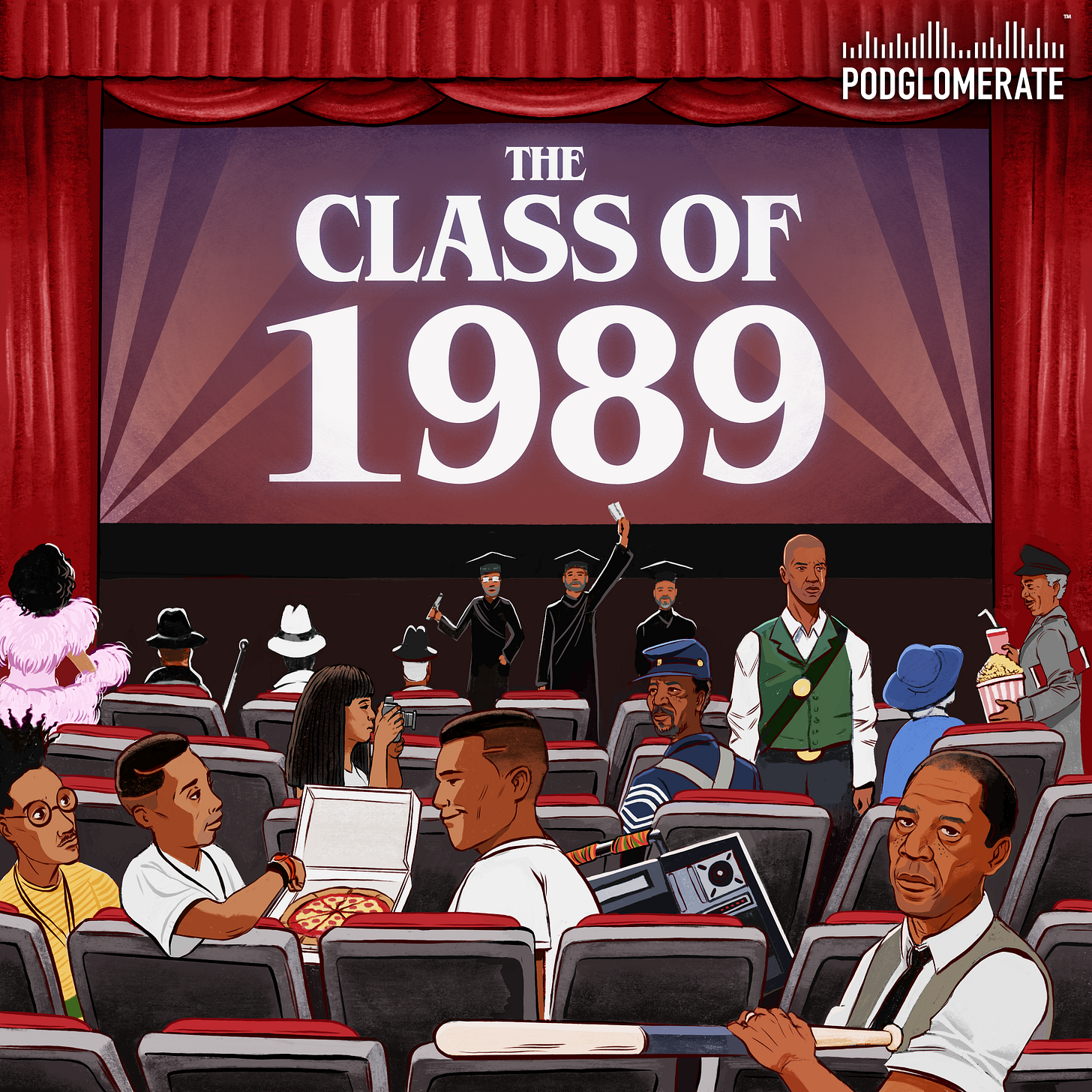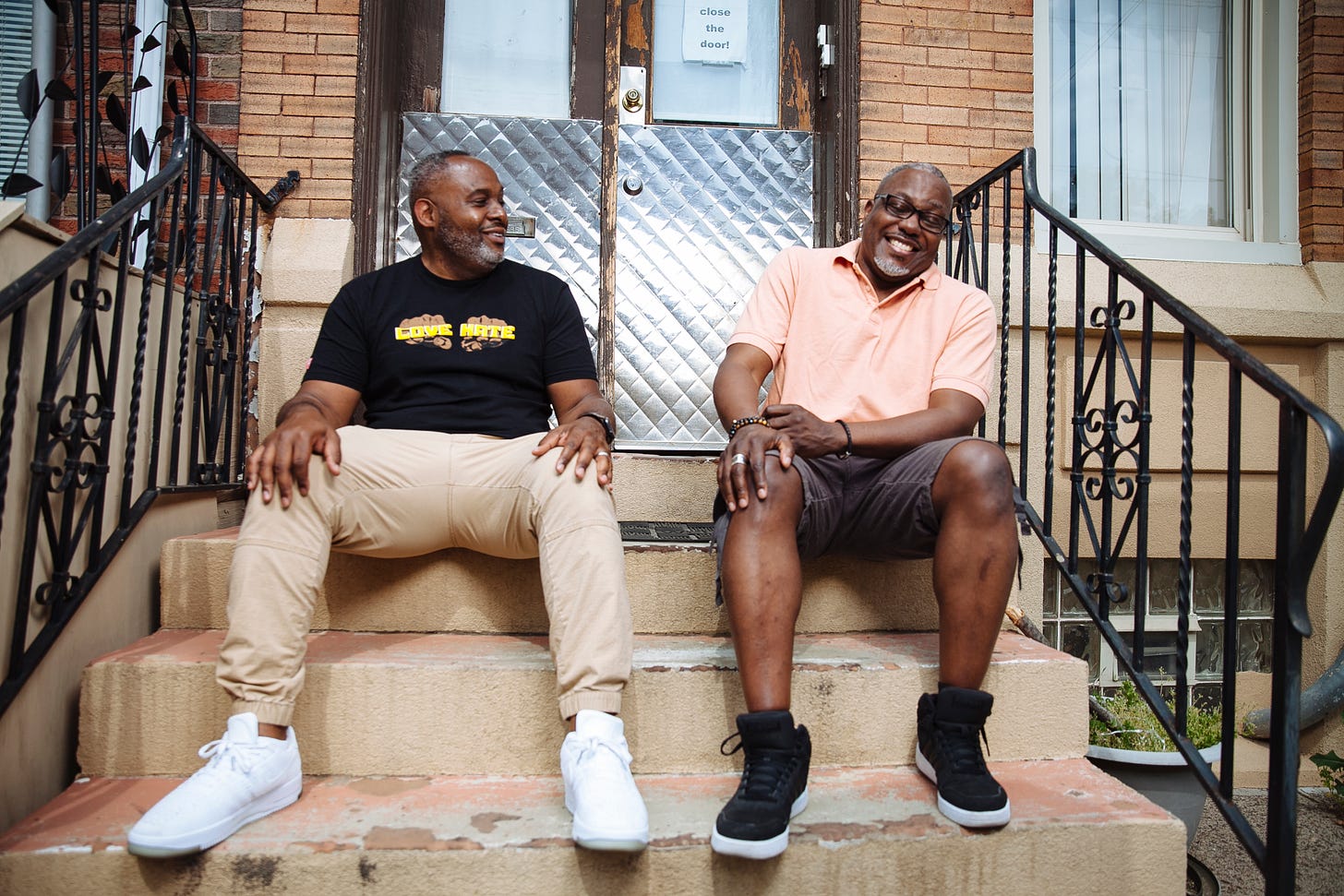The Class of 1989: Revisiting the Film Renaissance For Black America
An Interview with hosts Len Webb and Vincent Williams
This Post Is Sponsored By Press N Sow
Welcome to Press N' Sow – your ultimate Custom Retail Design and Promotional Products paradise! Experts in screen printing, embroidery, and direct-to-garment printing, catering to all your promotional needs! » Grab your Podcaster Deal Today! - Get 24 Shirts for $240 Contact Sylvia Today! «
Foreword
1989 was a big year for me, I was 12 years old going on 64. I was just starting my growth spurt and was almost as tall as my mother (She’s 5’6”) and getting ready to move on to my first year in 7th grade. I swore I was hot shit.
Conversations with my friends started to move from Saturday cartoons to “When I’m an adult the first thing I’m going to do is…”. We were looking to rush into adulthood with no clue what was waiting for us.
It was also pivotal for me because hip hop began to resonate with me like never before. From Biz Markie’s Just A Friend to finding a copy of the D.O.C’s It’s Funky Enough on the street and popping it into my walkman, hip hop would take its hold and never let go.
That year would be my first taste of the complexities of racism. My mother felt my sister and I were old or mature enough to watch “Do The Right Thing”. Before that all I knew of the movies was one of my favorite songs “Fight the Power” from Public Enemy.
At 12 years old I didn’t get all of the references and jokes, but there were two parts of the movie that stuck with me; the teenage boy hormone inducing Ice Cube scene between Mookie and Tina, and the assassination of Radio Raheem by the Police. The latter would be my introduction to the world of a growing black boy, fears of his parents, and America’s long history of police abuse in the Black community.
I appreciate my mother for this, because it would dictate how I handle the fucked up interactions I had with the police as I grew throughout the 90s’. I always knew the potential for me being Radio Raheem was always a strong possibility.
Though that movie resonated with me as a youth, there were other movies that year that would help shape me as well. Lean on Me, Tap, Harlem Nights, and Glory (my first real experience of the black slave experience in cinema) all played a role in exposing me to the various historical aspects of “Blackness” in America. All movies that I repeat lines from amongst friends till this day!
So when Joni Deutsch, VP of Marketing and Audience Development at Podglomerate, reached out to me and pitched me this new podcast that was launching called The Class of 1989 and what it was about, I was all ears. I knew we had to do something together, it was just a matter of figuring out the best way to bring it to you, our subscribers.
Truthfully, until I learned about this project, I never thought about how important 1989 was for Black cinema was. Not only from the movie subject matter, but the class of actors in these movies that I would grow up with as their careers grew - that’s the legacy of Black excellence in movies that 1989 created.
So without further ado, I bring to you an interview with the creators & hosts of The Class of 1989, Vincent Williams and Len Webb.
Corey Gumbs
BPA & BlkPodNews Founder
What inspired you to start The Class of 1989 podcast? What's the story behind its creation? And how does that differ from (or is similar to) the creation of The Micheaux Mission?
The Class of 1989 originated from our ongoing conversation about the arbitrary/biased nature of awards and acclaim. In that context, we ALWAYS talk about the fact that Driving Miss Daisy won the Best Picture Academy Award in 1989, but Do The Right Thing wasn’t even nominated!
From that seed, we realized three other films – Glory, Lean On Me, and Harlem Nights – were also released. During the making of The Class of 1989, we were blessed to have the input of several Black women filmmakers, critics, and creators who suggested we include A Dry White Season because of its historic standing as the first major studio film directed by a Black woman, Euzhan Palcy.
In many ways, both the Micheaux Mission and this project are rooted in collaboration and the amplification of Black critical voices; the former in conversations between us hosts (Len and Vincent), the latter between all of the wonderful participants.
What challenges did you face in creating and launching The Class of 1989, and how did you overcome them?
The vast majority of the obstacles were logistical. We constructed The Class of 1989 in the shadow of the pandemic so, like all of us, we learned to utilize tools like Zoom and Google Docs to make up for the fact that we couldn’t interview most of the participants in person.


Can you share some behind-the-scenes stories or experiences that occurred while producing The Class of 1989?
Here are two good ones: The comedian Daryl Charles went on an extended riff on how annoying it must have been to be the child of Morgan Freeman’s Hoke character from Driving Miss Daisy and how it helped prompt her success; “C’s! You’re bringing C’s in here?!?!
Do you KNOW what I have to go through everyday with this woman? I have to ask to USE THE BATHROOM! You can do better than C’s!” Funny stuff. The other story is the epitome of “you had to be there” when we worked the iconic “You know you done f@@ked up” into our conversation with Bill Duke. Pretty much the pinnacle of our lives.
How do you prepare for each episode, and what does your research and production process look like?
Lots and lots of reading and rewatches. Vincent is an academic and a self-proclaimed bookworm, so digging into research, history, and criticism is in his nature.
Len is a master interviewer, and a lot of his preparation is studying what our participants' past work has been, their additional work, and beyond, and that foreknowledge led to some remarkable conversations.
What have you learned from your podcasting journey so far, and how has it changed your view about podcasting from a Black perspective?
The biggest lesson has been that the podcast itself is just part of a bigger phenomenon. It’s been both fascinating and rewarding learning how much people respond to your work and the relationships that have grown from connections we’ve made over the past six years.
We think this is particularly important for us as Black people because many of us are scattered throughout the country – and, hell, the diaspora – so it’s wonderful that there’s this vehicle for us to create community.
Can you share some of your favorite episodes (whether from The Micheaux Mission and/or The Class of 1989) and explain why they stood out to you?
You want us to pick a favorite child! We think both the “Commercial Race Theatre” and “Oh, Oscar” episodes of The Class of 1989 are particularly strong because both focus on the many contexts these films exist in; cultural, commercial, artistic, and how those contexts still resonate.
Our favorite episode of Micheaux Mission is usually the last one we did but, appropriately enough, the episodes we’ve devoted to the films of ‘89. Driving Miss Daisy, Glory, Harlem Nights and Lean On Me are great deep critical dives and really give a new listener a taste of our approach to talking about movies
How do you see your podcast evolving in the coming years, and how do you plan to adapt to those changes?
Technically, we’re moving towards integrating more video into our presentation format because we do see the form going that way. Philosophically, we just see more of them coming! We LOVE how much people, especially Black folks, have embraced the form and, from the beginning, we’ve always been advocates for as many Black voices as possible using this platform. Our adapting strategy is to scoot over and make room!
What’s next for The Class of 1989? And if there were another season focused on a “class year,” what would the year be and why (and which films would it explore)?
We have a couple of subjects in the hopper that we’re looking forward to exploring. The “blessing” of there being so few projects around Black popular culture is that there are so many subjects that have remained untouched and are just waiting to be explored.
As far as a particular year like ‘89… that’s hard! We don’t know about a year but certainly there are eras that are ripe for exploration whether we’re talking the ‘90s renaissance of Black films, the amazing wave of Black women directors we’ve seen take the fore like Gina Prince-Bythewood, Ava Duvernay, and Nia DaCosta. Certainly, post-Get Out, we’re in a real Black horror moment. Lots and lots of subjects!
Follow & Listen to The Class of 1989 on your favorite podcast platform
👍🏽 Liked this Issue? Please share the same joy your felt with your friends and network.






